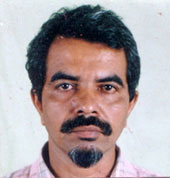Three years ago, on January 24, 2010, columnist and cartoonist Prageeth Eknelygoda vanished on his way to work to cover the final campaigning in Sri Lanka’s bitterly contested presidential election. He has not been heard from since. The pro-opposition website he worked for, Lanka eNews, has been repeatedly attacked, its offices hit with arson, its staff arrested and harassed, its editor driven into exile in England.
Hearings into Eknelygoda’s disappearance have been lumbering on in the Magistrates Court in Homagama, a distant suburb of Colombo. They were launched at the insistence of his wife, Sandhya, after she was unable to get an answer to her request for information about her husband from any member or agency of the government.
About the only official to make any comment on the fate of Eknelygoda was former Attorney General Mohan Peiris, when he answered questions at the U.N. Committee Against Torture in November 2011, in Geneva. In January 2012, the magistrate ruled that Peiris be called in as a witness to explain what he knows about Eknelygoda’s disappearance, but the government dodged this obligation.
Peiris had told the U.N. Committee Against Torture that Eknelygoda took refuge in a foreign country and that the campaign to solve his disappearance is a hoax–although he failed, then and ever since, to provide information about where Eknelygoda has supposedly fled. The government’s attorney, appearing before the magistrate, argued that because Peiris had been speaking on behalf of the government at the U.N., he cannot be held responsible for his remarks and need not appear in court. The attorney said officials are not required to disclose communications where “the public interest would suffer,” according to a person monitoring the court’s hearings.
While it’s doubtful Sri Lankan public interest would suffer if Peiris were to tell what the government knows, it is even more unlikely that he will be called again to testify, now that he has been appointed Chief Justice of the Supreme Court. He came to office January 15 after his predecessor, Chief Justice Shirani Bandaranayake, was impeached by Parliament, which is led by President Mahinda Rajapaksa’s ruling party.
The chief justice was charged in November 2012 with 14 counts of corruption, all of which she denied. She was found guilty of three of the charges. The government denies it turned against her after some unfavorable judgments, the BBC reported.
Peiris had been waiting in the wings for the job for years, biding his time as a special adviser to the cabinet after leaving the attorney general’s post he was holding back in February 2010, when he met with CPJ in his office. At the end of our interview, CPJ Deputy Director Rob Mahoney and I turned off our tape recorder and asked Peiris to intervene in the Eknelygoda case in some way, any way, to ease the pain of Sandhya and the couple’s two teenage sons. The case was barely a month old at the time, and he said he would look into it.
Sandhya Eknelygoda says she has never heard from Peiris or any other member of the Rajapaksa administration. But she has not given up.
“This fight to find Prageeth is my belief,” she told CPJ by email this week (a friend translated her comments from Sinhala.) “His case has become a leading indicator that there are serious human rights violations that go unresolved in Sri Lanka. Lots of things will change in the life of our two children, but we will continue this journey until we have justice.”
In the three years since Prageeth Eknelygoda disappeared, interest in his case has waned. The Rajapaksa family and the government it controls continue to cement their heavy-handed rule. Sandhya Eknelygoda at times appears at international meetings to make her plea for assistance in her husband’s case and the cases of the many other disappeared in Sri Lanka. The United Nations has repeatedly avoided coming to her assistance. Within Sri Lanka, opposition media has been all but silenced, and a score or more journalists have fled the country for their safety.
As former Chief Justice Bandaranayake put it to the BBC before she fled her home–she said her life was in danger–“the very tenor of the rule of law, natural justice, and judicial abeyance has not only been ousted, but brutally mutilated.”
Sandhya Eknelygoda says she agrees.
